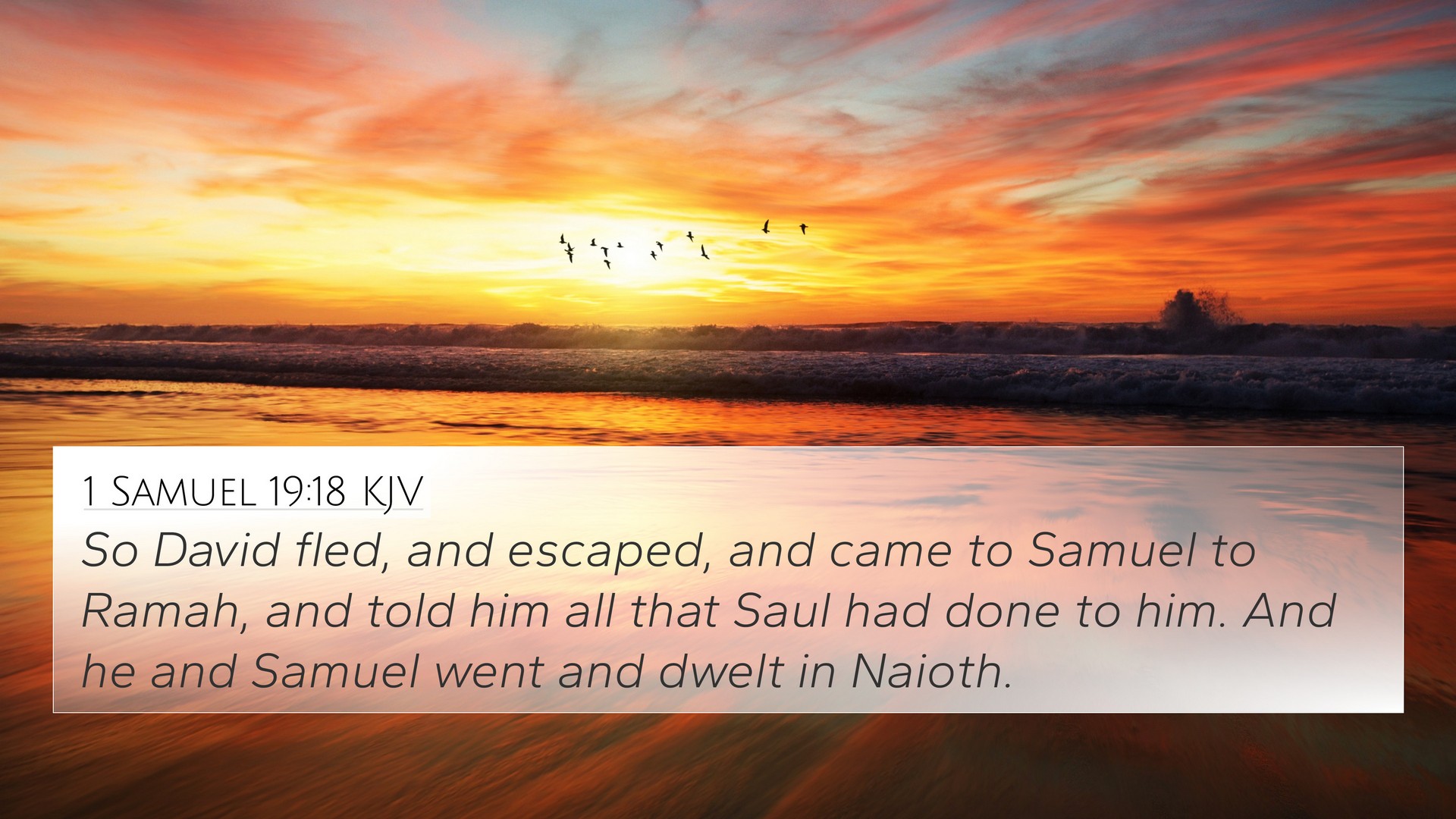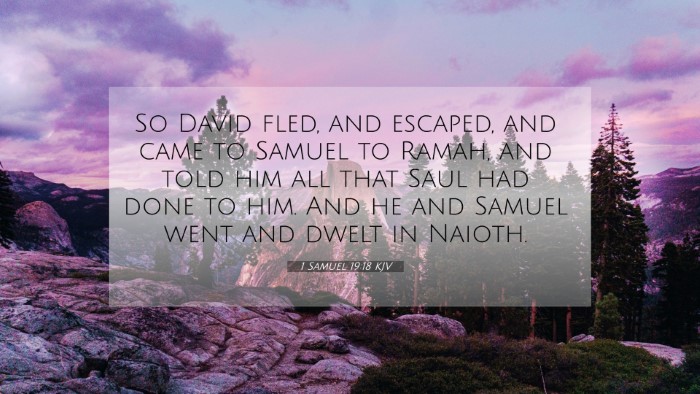Understanding 1 Samuel 19:18
Verse: 1 Samuel 19:18 - "So David fled, and escaped, and came to Samuel to Ramah, and told him all that Saul had done to him. And he and Samuel went and dwelt in Naioth."
Overview of the Verse
This verse captures a pivotal moment in David's life as he seeks refuge and guidance from Samuel after facing persecution from King Saul. The flight represents David's strategic and spiritual response to danger, indicating his reliance on God and His appointed prophets.
Commentary Insights
-
Matthew Henry:
Henry emphasizes David's wisdom in seeking Samuel, noting that it exemplifies humility in recognizing authority and seeking spiritual guidance. The verse illustrates the deep bond between David and Samuel, highlighting David's faithfulness in times of distress.
-
Albert Barnes:
Barnes points out the significance of Naioth, thought to be a location for prophets, indicating that David was not merely escaping from Saul but also seeking the spiritual counsel of God. This illustrates that even in peril, David sought companionship with the faithful.
-
Adam Clarke:
Clarke offers insights into the emotional and spiritual turmoil faced by David preemptively, indicating that fleeing to Samuel was an act of desperation infused with belief in God’s protection. His flight portrays David's faith and the importance of seeking divine intervention in trouble.
Thematic Connections
The account of David fleeing to Samuel connects to several broader themes found throughout the Bible, such as the concepts of leadership, divine appointment, and reliance on God’s protective care.
Related Bible Verses
- Psalm 18:1-2: "I will love you, O Lord, my strength. The Lord is my rock and my fortress and my deliverer; my God, my strength, in whom I will trust."
- 1 Samuel 16:13: "Then Samuel took the horn of oil and anointed him in the midst of his brothers; and the Spirit of the Lord came upon David from that day forward."
- 1 Samuel 20:1: "Then David fled from Naioth in Ramah, and went and said to Jonathan, 'What have I done?'
- 1 Peter 5:7: "Cast all your anxiety on him because he cares for you."
- Hebrews 11:32-34: "And what more shall I say? For time would fail me to tell of Gideon and Barak and Samson and Jephthah, of David and Samuel and the prophets."
- Luke 4:25-27: "But I tell you truly, many widows were in Israel in the days of Elijah, and none of them was cleansed except Naaman the Syrian." (Link to prophetic ministry)
- Acts 13:22: "And when He had removed him, He raised up for them David as king, to whom also He gave testimony and said, 'I have found David the son of Jesse, a man after My own heart, who will do all My will.'
Connections Between Bible Verses
The events following 1 Samuel 19:18 establish profound links between the Old and New Testaments, where themes of persecution, faithfulness amidst trials, and the nature of divine calling surface frequently.
Cross-Referencing Biblical Texts
This passage exemplifies how believers can benefit from cross-referencing biblical texts to glean deeper insights into God's character and His faithfulness amidst adversity.
Practical Application
David's flight to Samuel serves as a reminder for believers today to seek godly counsel in times of trouble and to place their trust in God’s plan. Leveraging tools for Bible cross-referencing can enhance understanding of how various scriptures interact and support each other thematically.
Utilizing Bible Reference Resources
Engaging with comprehensive Bible cross-reference materials can aid in uncovering connections between passages like 1 Samuel 19:18 and other scriptures, drawing thematic parallels and enhancing personal faith journeys.
Conclusion
1 Samuel 19:18 is a rich source of insight into David’s character, his relationship with God, and the guidance provided by spiritual mentors like Samuel. By employing cross-referencing techniques, readers can discover profound relational and thematic connections throughout the Scriptures that deepen understanding and strengthen faith.







